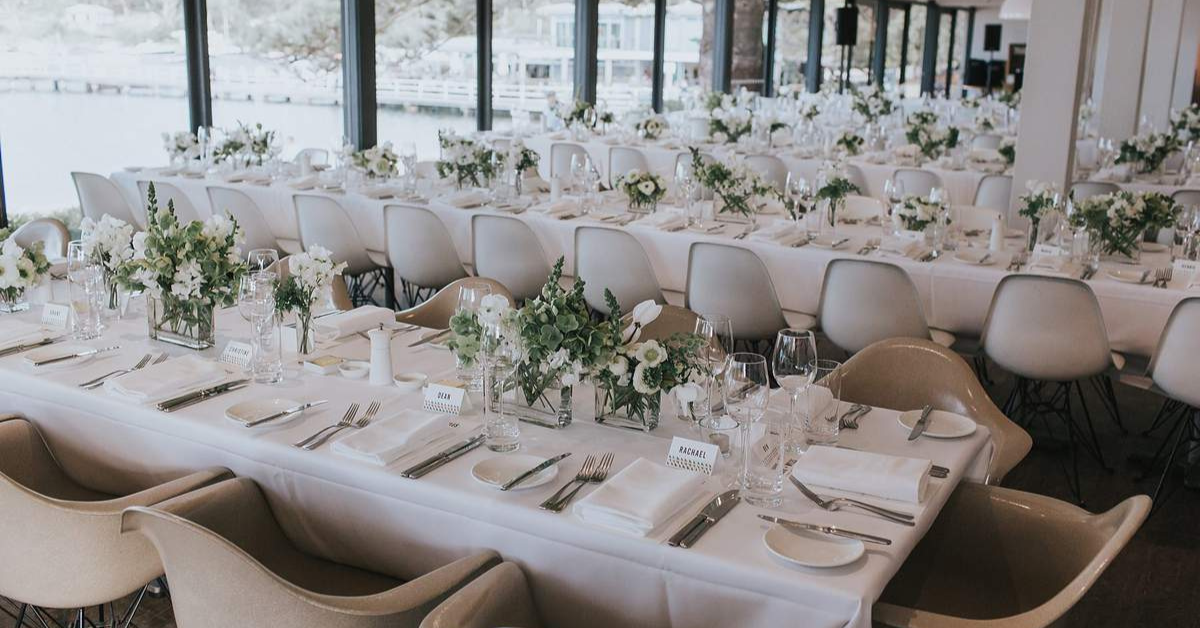“Hospitality Marketing in Australia: The Ultimate Playbook” is a comprehensive guide designed to help hotel, restaurant, bar, and wedding venue marketers understand all the aspects of hospitality marketing they need in order to succeed in the highly competitive Australian market.
The playbook is divided into several sections, each of which explores a different aspect of marketing your hospitality business.
- Importance of marketing for Australian hospitality venues
- Overview of the Australian hospitality industry
- Defining your venue’s Unique Selling Proposition (USP)
- Creating your venue’s marketing plan
- Venue branding and reputation management
- The essential elements of digital marketing
- How to generate awareness with direct marketing
- Sponsorship and partnership for venues
- Public relations and event marketing
- Measuring the success of your marketing efforts
- Final thoughts and next steps
The first section provides an overview of the hospitality industry in Australia. This sets the stage for the rest of the book, providing valuable insights into the industry that will help you understand the challenges and opportunities that lie ahead.
We then examine branding and reputation management, two critical components of hospitality marketing in Australia.
You will learn how to create a strong brand identity that resonates with your target audience, as well as how to manage your online reputation to ensure that your hospitality business is perceived in the best possible light.
We then dive into digital marketing, including website design, SEO, social media, email marketing, and online advertising such as pay-per-click Google Ads for hotels.
You will learn how to leverage these tools to drive traffic to your website, generate leads, and increase conversions.
The traditional marketing channels of direct marketing and sponsorship and events are then explored. You will learn how to use these channels effectively to reach your target audience and generate buzz about your business.
The final section ties everything together, providing a roadmap for implementing a comprehensive marketing strategy for hospitality marketing in Australia. You will learn how to measure your success, adjust your strategy as needed, and continue to grow your business over time.
Overall, “Hospitality Marketing in Australia: The Ultimate Playbook” is your FREE comprehensive guide to making hospitality marketing much easier and more effective.
Whether you are a seasoned marketer or a first-time business owner, this book will provide you with the tools and insights you need to succeed in the competitive Australian hospitality market.

Importance of hospitality marketing for Australian hotels and venues
Marketing is a crucial aspect of any business, including hospitality venues. In the highly competitive Australian hospitality industry, marketing can make the difference between success and failure. The importance of marketing for hospitality venues cannot be overstated, as it helps to attract new customers, retain existing ones, and increase revenue.
One of the primary reasons why marketing is so important for hospitality venues is that it helps to create brand awareness. By promoting your venue through various marketing channels, such as social media, email marketing, and advertising, you can increase the visibility of your brand and attract more customers. Brand awareness is particularly important for new hospitality venues, as it helps to establish their presence in the market.
Marketing also helps to create customer loyalty. By engaging with your customers through targeted marketing campaigns, you can build a strong relationship with them and encourage them to return to your venue. This is particularly important in the hospitality industry, where repeat business is essential for success.
Another key benefit of marketing is that it can help to increase revenue. By promoting special offers, events, and promotions, you can encourage customers to spend more money at your venue. Marketing can also help to drive foot traffic to your venue, which can increase sales and revenue.
In addition to these benefits, marketing can also help to differentiate your venue from competitors. By highlighting your unique selling points and promoting your brand, you can stand out in a crowded market and attract more customers.
In conclusion, marketing is essential for the success of hospitality venues in Australia. By creating brand awareness, building customer loyalty, increasing revenue, and differentiating your venue from competitors, marketing can help to drive growth and profitability. As a hospitality venue owner or marketer, it is important to invest in marketing to ensure the long-term success of your business.
Target Audience
One of the most critical aspects of hospitality marketing in Australia is understanding your target audience. In the hospitality industry, your target audience can vary depending on the type of venue you own or manage.
Additionally, the Australian market is unique, with its own set of cultural nuances and preferences. Understanding your target audience is crucial to crafting a successful marketing strategy.
When it comes to hospitality marketing in Australia, there are several factors that can influence your target audience. The first is location.
Depending on where your venue is located, you may attract different types of customers. For example, a beachfront restaurant may attract more tourists, while a bar in the city may cater more to locals.
Another critical factor is the type of venue you own or manage.
A fine dining restaurant will have a different target audience than a wedding venue or trendy bar. Knowing your venue’s unique selling points will help you better understand who your target audience is.
Understanding the demographics of your target audience is also essential. This includes age, income, and gender. For example, if you are targeting millennials, your marketing strategy may need to be more tailored to social media platforms such as Instagram and TikTok.
Alternatively, if your target audience is an older demographic, traditional print advertising may be more effective.
One of the most effective ways to understand your target audience is through market research. This can include surveys, focus groups, and social media analytics. By gathering data on your customers’ preferences and behaviours, you can better tailor your marketing strategy to meet their needs.
In summary, understanding your target audience is critical to crafting a successful marketing strategy for your hospitality venue. By considering factors such as location, venue type, and demographics, you can better tailor your marketing efforts to reach the right people. Conducting market research can also provide valuable insights into your customers’ preferences and behaviours.

Overview of the Australian Hospitality Industry
The hospitality industry in Australia is a thriving and dynamic sector that is quickly regrowing after the Covid pandemic. The industry is diverse and includes a range of businesses such as hotels, restaurants, cafes, bars, and clubs. With the increasing number of tourists visiting Australia every year since Covid, there is an ever-growing demand for high-quality hospitality services.
However, the hospitality industry in Australia is highly competitive, and businesses need to have a strong marketing strategy in place to stay ahead of the curve.
The key to success in this industry is to understand the needs and preferences of your target audience and tailor your marketing efforts accordingly.
One of the most significant trends in the hospitality industry in Australia is the growing demand for sustainable and locally sourced food and beverages. Consumers are becoming increasingly conscious of the impact of their choices on the environment, and this is reflected in their dining preferences. Hospitality venues that prioritise sustainability and ethical food sourcing are likely to see a surge in demand.
Another trend that is gaining traction in the industry is the use of technology to enhance the customer experience. From online booking platforms to mobile apps that allow customers to order and pay for their meals, technology is transforming the way hospitality businesses operate.
The hospitality industry in Australia is a vibrant and exciting sector that offers a wealth of opportunities for hospitality venue owners or marketers. To succeed in this industry, businesses need to stay abreast of the latest trends and use innovative marketing strategies to attract and retain customers.
Current trends and challenges for hospitality marketing in Australia
Current trends and challenges in Australian hospitality marketing are constantly evolving and it can be challenging to keep up. In this subchapter, we will explore the current trends and challenges facing hospitality venue owners and marketers in Australia.
One of the biggest trends in hospitality marketing in Australia is the shift towards digital marketing. With the rise of social media and mobile devices, more people are accessing information online than ever before.
To stay competitive, hospitality venues must have a strong online presence. This means having a website that is mobile-friendly and easy to navigate, as well as an active presence on social media channels such as Facebook, Instagram, and Twitter.
These days, when your potential customers are deciding where to eat, stay or play, the first thing they’ll usually do is pull out their smartphone and start a Google search using a local search query like ‘restaurant near me’ or ‘best bars in Sydney’.
Google calls this online decision-making moment the ‘Zero Moment of Truth (ZMOT).
The ZMOT refers to the moment in the buying process when the consumer researches a venue, product or service prior to purchase.
If your hospitality business fails this ZMOT, it’s unlikely you’ll ever hear from the customer, let alone have them make a booking.
Another trend in hospitality marketing is the rise of experiential marketing. Customers are no longer satisfied with just a meal or a night out – they want a unique experience that they can share with their friends and family.
This means that businesses must focus on creating memorable experiences that set them apart from the competition. For example, a restaurant might offer a cooking class or a special tasting menu to give customers a behind-the-scenes look at their operations.
Despite these trends, there are several challenges that hospitality venue owners and marketers face.
One of the biggest challenges is the increasing competition in the industry.
For example, 151 new four and five-star hotels are set to open in Australia in 2023 and beyond, comprising 26,776 new rooms.

With so many options available, customers can easily switch to a competitor if they are not satisfied with their experience.
This means that businesses must constantly strive to improve and market their offerings to stay competitive.
Another challenge is the cost of marketing. Hospitality marketing can be expensive, especially when it comes to advertising and promotions (fortunately, we have some great packages/pricing to help!)
Businesses must be able to effectively balance their marketing budget with other expenses to ensure profitability.
In conclusion, the hospitality industry is constantly evolving, and businesses must be able to adapt to stay competitive. By keeping up with the latest trends and addressing the challenges facing the industry, hospitality venue owners and marketers can create successful marketing strategies that drive growth and profitability.
Target market and audience segmentation
Target market and audience segmentation are crucial components of any successful marketing plan for hospitality venues in Australia.
Understanding who your target market is and how to effectively reach them can make all the difference in attracting new bookings and retaining customers.
The first step in identifying your target market is to conduct market research. This can include analysing demographic data, consumer behaviour trends, and competitor analysis. By understanding the needs and wants of your potential customers, you can tailor your marketing efforts to better reach them.
Once you have identified your target market, it is important to segment them into specific groups based on their characteristics and behaviours. This allows you to create targeted marketing messages that speak directly to their interests and needs.
Segmentation can be done in several ways, including geographic, demographic, psychographic, and behavioural segmentation.
Geographic segmentation divides your target market based on their location, while demographic segmentation looks at factors such as age, gender, income, and education level.
Psychographic segmentation focuses on personality traits, values, and lifestyles, while behavioural segmentation divides customers based on their purchasing habits and decision-making processes.
By using a combination of these segmentation strategies, you can create a detailed profile of your target market and tailor your marketing efforts accordingly.
For example, if you own a luxury hotel in Sydney, your target market may be high-income individuals aged 35-55 who value luxury and convenience.
By targeting this specific group through targeted advertising and promotions, you can increase your chances of attracting and retaining these valuable customers.
In summary, understanding your target market and segmenting them into specific groups is crucial for effective hospitality marketing in Australia. By tailoring your marketing efforts to better reach your target audience, you can increase your chances of success and stand out in a crowded marketplace.

Lancemore Lindenderry Red Hill
Competitor analysis
One of the most crucial aspects of marketing your hospitality venue in Australia is understanding your competitors. Competitor analysis is the process of identifying and evaluating your competitors’ strengths and weaknesses to gain a competitive advantage. By doing so, you can differentiate your business from your rivals and create a unique value proposition that resonates with your target audience.
Here are some key steps to conducting competitor analysis for your hospitality venue:
Identify Your Competitors
The first step is to identify your competitors. This includes both direct and indirect competitors. Direct competitors are those who provide similar products or services to your business, while indirect competitors are those who offer alternative solutions to your target audience’s needs.
To identify your competitors, you can conduct online research, visit their websites and social media pages, and even visit their physical locations.
Evaluate Your Competitors
Once you have identified your competitors, the next step is to evaluate their strengths and weaknesses. This includes analysing their marketing strategies, pricing, product offerings, customer service, and reputation.
You can use tools like Google Analytics and social media monitoring software to track your competitors’ online presence and customer engagement. You can also gather customer feedback from review sites and surveys to gain insights into what your competitors are doing well and where they are falling short.
Differentiate Your Business
Based on your competitor analysis, you can identify areas where your business can differentiate itself. This could be through unique product offerings, pricing strategies, or marketing messages.
For example, if your competitor is known for their budget-friendly prices, you can differentiate your business by offering premium products or services for a higher price point. Alternatively, if your competitor has a strong online presence, you can differentiate your business by focusing on in-person experiences and building a strong reputation in your local community.
Competitor analysis is a crucial component of marketing your hospitality venue in Australia. By understanding your competitors’ strengths and weaknesses, you can identify areas to differentiate your business and create a unique value proposition that resonates with your target audience. Take the time to conduct a thorough competitor analysis to gain a competitive advantage in the highly competitive hospitality industry.

Defining Your Unique Selling Proposition (USP)
Understanding the concept of USP
In the highly competitive Australian hospitality industry, it’s essential to have a unique selling proposition (USP) that sets your venue apart from the rest. A USP is a statement that outlines what makes your venue unique and why customers should choose your venue over your competitors.
To determine your USP, you need to identify what sets your venue apart from the competition. It could be your location, your menu, your atmosphere, your customer service, or any combination of these factors.
Once you have identified your USP, it’s essential to communicate it effectively to your target audience. This can be done through marketing campaigns, social media, and other promotional activities.
Here are some tips for developing and promoting your USP:
1. Identify your unique selling proposition
Take some time to think about what makes your venue unique. What do you offer that your competitors don’t? What do your customers love about your venue? Use this information to develop a clear and concise USP.
2. Communicate your USP effectively
Once you have developed your USP, it’s essential to communicate it effectively to your target audience. This could be through marketing campaigns, social media, or other promotional activities. Make sure your USP is front and centre in all of your marketing materials.
3. Focus on the benefits
When promoting your USP, focus on the benefits to the customer. What do they get by choosing your venue over the competition? This could be a unique dining experience, exceptional customer service, or any other benefit that sets you apart.
4. Focus on Your Specialty
Every venue has something they do exceptionally well. It could be a signature dish, a unique event space, or exceptional customer service. Whatever it is, focus on it and make it the centrepiece of your marketing efforts. Use it to differentiate yourself from your competition and attract customers who are looking for that specific offering.
5. Be Authentic
Your USP should be authentic and genuine. Don’t try to be something you’re not or try to mimic your competition. Instead, focus on what makes your venue unique and highlight it in your marketing efforts.
In conclusion, identifying your venue’s USP is a crucial step in developing a successful marketing strategy. By analysing your competition, understanding your target market, focusing on your specials, and being authentic, you can differentiate yourself from your competition and attract customers who are looking for what your venue has to offer.
Leveraging your USP in marketing efforts
As an Australian hospitality venue owner or marketer, it’s crucial to understand the importance of your Unique Selling Proposition (USP) in your marketing efforts. Your USP is the factor that sets your venue apart from the competition and gives you a competitive edge in the market. Leveraging your USP can help you attract more customers, increase your revenue and establish your brand identity in the market.
Here are some ways to leverage your USP in your marketing efforts:
1. Highlight your USP in your branding and messaging
Your USP should be the foundation of your branding and messaging. Make sure your logo, website, social media profiles, and other marketing materials reflect your USP and communicate it clearly to your target audience. Use your USP as a tagline or slogan in your advertising campaigns to reinforce your unique selling point.
2. Create targeted marketing campaigns
Once you have identified your USP, create targeted marketing campaigns that emphasize it. For example, if your USP is a farm-to-table concept, create campaigns that highlight the locally sourced ingredients and sustainable farming practices used in your venue. This will help you attract customers who value organic and locally sourced food.
3. Collaborate with influencers and partners
Collaborating with influencers and partners who align with your USP can help you reach a wider audience and establish your brand identity in the market. Look for influencers and partners who share your values and can help you promote your USP through their network.
4. Offer unique experiences
Offering unique experiences that align with your USP can help you stand out from the competition. For example, if your USP is a rooftop bar with a stunning view, offer unique events such as sunset cocktails, live music, and themed parties that take advantage of the view and create an unforgettable experience for your customers.
In conclusion, leveraging your USP in your marketing efforts is essential to establish your brand identity, attract more customers, and increase your revenue.
By highlighting your USP in your branding and messaging, creating targeted marketing campaigns, collaborating with influencers and partners and offering unique experiences, you can establish your venue as a leader in the market and build a loyal customer base.
Creating Your Australian Hospitality Marketing Plan
A hospitality marketing plan serves as a roadmap for how your Australian hotel or venue will reach its target audience, build brand awareness, and generate revenue. In this chapter, we will discuss the key components of an Australian hospitality marketing plan and how to create one that will help your venue stand out from the competition.
1. Target Market: The first step in creating a marketing plan is to focus on the target market earlier. Who is your ideal customer, and what are their needs and preferences? Understanding your target market will help you tailor your marketing efforts to their specific interests and increase the likelihood of attracting and retaining customers.
2. Unique Selling Proposition: What sets your hospitality venue apart from others in the industry? As discussed earlier, your unique selling proposition (USP) is what makes your venue special and should be highlighted in your marketing efforts. Whether it’s your location, menu, or customer service, make sure to communicate your USP clearly to potential customers.
3. Marketing Mix: The marketing mix includes the four Ps: product, price, promotion, and place. Product refers to the services and amenities your hospitality venue offers, while the price is what you charge for those services. Promotion includes advertising, public relations, and other marketing efforts, and place refers to the physical location of your venue. Developing a strong marketing mix is essential for reaching your target market and generating revenue.
4. Action Plan: An action plan outlines the specific steps you will take to implement your marketing plan. This includes creating a timeline, assigning responsibilities, and setting measurable goals. An action plan ensures that your marketing efforts are focused and effective.
5. Budget: A marketing plan should include a budget that outlines how much you can afford to spend on marketing efforts. This includes advertising, promotions, and other marketing expenses. Creating a realistic budget ensures that you are maximising your marketing efforts while staying within your financial means.
In conclusion, a hospitality marketing plan is a crucial component of any successful Australian hotel or venue. By identifying your target market, developing a unique selling proposition, creating a strong marketing mix, and implementing an action plan, you can effectively reach your target audience and generate revenue.
With the right marketing strategy, your hospitality venue can thrive in the competitive Australian market.
Setting marketing objectives and goals
As a hospitality venue owner or marketer in Australia, it is important to have a solid understanding of the importance of setting marketing objectives and goals. Without a clear direction in mind, it can be easy to waste valuable time, money, and resources on marketing efforts that don’t produce the desired results.
So, what exactly are marketing objectives and goals? Simply put, they are the specific, measurable, achievable, relevant, and time-bound outcomes that you hope to achieve through your marketing efforts.
Setting these objectives and goals can help you stay focused on your ultimate business objectives, whether that’s increasing revenue, expanding your customer base, or enhancing your brand image.
Branding Your Hospitality Venue
As a hospitality venue owner or marketer, one of the most important things you can do is define your brand identity. Your brand identity is the way that customers perceive your business and what sets you apart from your competitors. It should clearly communicate the personality of your business.
There are several things that you can do to define your brand identity. The first thing you should do is think about the target audience you identified earlier. Who are you trying to reach? What are their needs and wants? Try to put yourself in their shoes and think about what kind of brand would appeal to you.
The next thing you should do is develop a brand personality. This is the way that you want your customers to perceive your business. Are you fun and playful, or are you sophisticated and professional? Whatever your brand personality is, it should be consistent throughout all of your marketing efforts.
Once you have identified your target audience, developed a brand personality, and understood your USP, you can start to develop your brand messaging.
This is the way that you communicate your brand identity to your customers. It should be consistent across all of your marketing channels, including your website, social media, and digital advertising.
Finally, it’s important to monitor your brand identity and make adjustments as needed. Keep an eye on customer feedback and reviews, and make changes to your marketing efforts if necessary. Your brand identity should evolve as your business grows and changes.
Defining your brand identity is an essential part of your hospitality marketing in Australia. By identifying your target audience, developing a brand personality, creating a unique selling proposition, and developing consistent brand messaging, you can build a strong brand that sets you apart from your competitors and attracts loyal customers.
Developing a brand positioning statement
Developing a brand positioning statement is crucial for any hospitality venue looking to establish a strong brand identity in the market. A brand positioning statement is a clear and concise statement that describes what your brand stands for, what sets it apart from competitors, and who it is targeted towards. It is a key component of your brand strategy and should guide all your marketing efforts.
Branding your venue through visual elements
In the hospitality industry, great branding is critical. It is what sets your venue apart from your competitors and makes your establishment memorable to your customers. One way to strengthen your brand is through the use of visual elements.
Visual elements are the design elements that are used to define the look and feel of your venue.
They include your logo, colour scheme, signage, menu design, and website design. These elements should be consistent across all your marketing materials, both online and offline.
Here are some tips on how to use visual elements to brand your venue:
1. Develop (or refine) your Logo
Your logo is the cornerstone of your visual identity. It should be memorable, unique, and relevant to your venue. It should be used consistently across all your marketing materials, including your website, social media profiles, signage, and menus.
2. Choose a Colour Scheme
Your colour scheme should reflect the atmosphere and vibe of your venue. For example, bright and bold colours are often used in casual dining establishments, while muted, sophisticated colours are used in fine dining establishments. Choose two or three colours and use them consistently across all your marketing materials.
3. Create Signage
Signage is an essential element of your visual identity. Your signage should be easily readable, visible from a distance, and consistent with your colour scheme and logo.
4. Design Your Menu
Your menu is an important part of your branding. It should be well-designed, easy to read, and consistent with your other visual elements. It should also reflect the style and atmosphere of your venue.
5. Develop a Website
Your website is often the first point of contact for potential customers. It should be well-designed, easy to navigate, and consistent with your other visual elements. It should also provide all the information your customers need, such as your menu, opening hours, and location.
In conclusion, branding your venue through visual elements is essential to creating a memorable and recognisable brand. By developing a strong visual identity, you will be able to stand out from your competitors and attract more customers to your establishment.
The Essential Elements of Hospitality Digital Marketing in Australia
Overview of digital marketing
Digital marketing is a term used to describe the promotion of products or services through digital channels such as search engines, social media, email, and websites.
It has become an essential component of any hospitality marketing strategy due to the increasing use of the internet and mobile devices by consumers.
In this chapter, we will provide an overview of digital marketing and its importance in hospitality marketing in Australia.

Search Engine Optimisation (SEO)
Search Engine Optimisation (SEO) is the process of optimising your website to rank higher in search engine results pages (SERPs).
This means that when people search for keywords related to your business, your website appears at the top of the results page.
SEO is a long-term strategy that requires consistent effort and attention to detail. It involves optimising your website’s content, technical structure, and user experience to improve its visibility on search engines.

Social Media Marketing
Social media marketing involves using social media platforms such as Facebook, Instagram, Twitter, and LinkedIn to promote your business.
It is an effective way to build brand awareness, engage with your audience, and drive traffic to your website.
Social media marketing requires a strong strategy that includes creating engaging content, responding to comments and messages, and analysing your performance to improve your results.
Paid Social and PPC Ads
Pay Per Click (PPC) ads like Google Ads and paid social ads play a crucial role in the marketing strategy of hospitality venues.
These advertising platforms provide a powerful means for hotels and venues to increase their visibility, attract customers, and boost their business.
With Google Ads, hospitality venues can target potential customers who are actively searching for relevant keywords, such as hotels, restaurants, or tourist attractions in a specific location.
This enables them to reach a highly targeted audience and drive qualified traffic to their websites or booking platforms.
Paid social ads, on the other hand, allow venues to leverage the vast user bases of platforms like Facebook, Instagram, and Twitter to reach potential customers based on their demographics, interests, and behaviours.
These ads enable venues to showcase their offerings, engage with their target audience, and drive bookings or reservations. Both Google Ads and paid social ads provide measurable results, allowing hospitality venues to optimise their campaigns, allocate their advertising budgets effectively, and achieve a higher return on investment.
Overall, leveraging these advertising channels can significantly enhance the visibility and profitability of hospitality venues in today’s digital landscape.

Online Review and Reputation Management
Online reviews and reputation management are of paramount importance for hospitality venues as potential customers heavily rely on online reviews to make informed decisions about where to stay, dine, or visit.
Positive reviews can act as powerful endorsements, attracting new guests and building trust in the venue’s offerings.
Conversely, negative reviews can deter potential customers and harm the reputation of the establishment. Research shows that if your hospitality venue’s average ‘Star’ rating is less than ‘4’, customers will not consider visiting or making a booking.
Effective reputation management involves actively monitoring and responding to online reviews across various platforms, such as TripAdvisor, Google, and social media.
Engaging with reviews, whether positive or negative, demonstrates the venue’s commitment to customer satisfaction and helps to build a positive brand image.
Responding promptly and professionally to negative reviews shows potential guests that the venue takes feedback seriously and is proactive in addressing concerns.
CTA: Download review response templates
Moreover, actively encouraging satisfied guests to leave positive reviews can amplify the venue’s online reputation and attract more customers (and local search ranking).
Listings Management
Online business directory listings play a significant role in the success of hospitality businesses.
These directories, both online, provide a centralised platform for potential customers to discover and learn about various hospitality establishments.
Being listed in reputable directories increases the visibility and accessibility of hospitality businesses to a wide range of audiences, including locals, tourists, and business travellers.
It allows these venues to showcase their amenities, services, location, contact information, and other essential details.
Business directory listings also contribute to Local SEO efforts, as search engines often consider information from these directories to validate the credibility and relevance of a business.
However, it’s very important to ensure that your Name, Address and Phone (NAP Data) are consistent and accurate across all your directory listings as Google could penalise your ranking in the ‘Local 3-Pack’ if there are inaccuracies.
Moreover, directory listings can enhance the credibility and trustworthiness of hospitality businesses, as being listed in reputable directories establishes a sense of legitimacy and professionalism.
Ultimately, having a strong presence in relevant business directories increases the chances of attracting new customers, boosting reservations or bookings, and staying ahead of competitors.
Email Marketing
Email marketing involves sending promotional emails to your subscribers to promote your business.
It is an effective way to keep your audience engaged, drive traffic to your website, and promote your special offers.
Email marketing requires a strong strategy that includes creating valuable content, segmenting your audience, and analysing your performance to improve your results.
For example, with good segmentation, you can directly promote birthday or anniversary special offers to your customer base.
Website Design and Development
Your website is your digital storefront, and it is essential to have a website that is visually appealing, easy to navigate, and optimised for search engines.
Website design and development involve creating a website that meets your business’s needs, including the ability to showcase your products or services, capture leads, and engage with your audience.
Developing a website for your venue
Developing a website for your venue is an essential part of marketing your hospitality business. In today’s digital age, having a website is non-negotiable, and it is the first thing potential customers will look for when searching for your venue online.
The first step in developing a website is to choose a domain name that reflects your brand and is easy for customers to remember. Your domain name should be short and concise and should ideally include your business name. You can register your domain name with a domain registrar and choose a hosting platform to host your website.
The next step is to design your website. Your website should be visually appealing, easy to navigate, and should provide all the necessary information that customers need, such as your contact details, opening hours, menus, and pricing.
Once your website is up and running, you need to ensure that it is optimised for search engines.
This means using relevant keywords in your content, optimising your images and videos, and ensuring that your website is mobile-friendly.
You should also integrate social media into your website by including social media icons and links to your social media profiles.
Finally, it is crucial to regularly update your website with fresh content, such as blog posts, news updates, and special promotions.
This will not only keep your customers engaged but also help improve your search engine rankings.
In conclusion, developing a website for your venue is an essential part of hospitality marketing in Australia.
By following the steps outlined above, you can create a website that is visually appealing, easy to navigate and optimised for search engines, which will help attract more customers and grow your business.

Search Engine Optimisation (SEO) for hospitality venues
With the majority of your potential guests turning to search engines like Google to research and book their functions and events, dining and accommodations, it’s essential for hospitality venues to optimise their websites for search engines.
Here are some tips for optimising your hospitality venue’s website for search engines:
1. Conduct keyword research
Keyword research is the process of discovering the words and phrases people use when searching for products or services like yours.
By conducting keyword research, you can identify the keywords and phrases your potential customers are using and optimise your website accordingly.
Tools like SemRush, Ahref’s and Google Keyword Planner can help you figure out which keywords your potential customers (and competitors) are focussed on. These keywords will form the basis for the rest of your hospitality marketing in Australia.
2. Optimise your website’s content
Once you’ve identified your target keywords, it’s time to optimise your website’s content. This includes your website’s page titles, meta descriptions, and content.
Ensure that your content is high-quality, informative, and relevant to your target audience and optimised for the keywords you’re hoping to rank for.
3. Utlise local SEO strategies
Local SEO is a vital component for hospitality venues, as potential guests and travellers often search for dining or accommodation options in specific locations using their mobile devices.
Ensure that your website is optimised for local search by including your venue’s address, phone number, and hours of operation on your website and having accurate and consistent name, address and phone number (NAP data) listed on all the major online directories.
4. Utlise social media
Social media is an excellent way to increase your website’s visibility and drive traffic to your site. By sharing your website’s content on social media platforms like Facebook, Twitter, and Instagram, you can expand your reach and attract new customers.
5. Monitor your website’s performance
Monitoring your website’s performance is essential to ensure that your SEO strategy is working effectively.
Utlise tools like Google Analytics to track your website’s traffic, bounce rate, and conversion rate. By analysing this data, you can identify areas where you can improve your SEO strategy.
SEO is a critical component of any hospitality marketing in Australia.
By conducting keyword research, optimising your website’s content, utilising local SEO strategies, posting to social media, and monitoring your website’s performance, you can drive more organic (free) traffic to your website and attract new customers.

Social media marketing for Australian hospitality venues
Social media marketing has become an essential tool for hospitality venues in Australia to connect with their audience and drive business growth.
When it comes to social media marketing, understanding your audience is key.
Knowing who your customers are, what they like, and how they engage with your brand can help you create a successful social media strategy.
For example, if your venue caters to young professionals, Instagram may be the best platform to showcase your food and drinks, while Twitter may be better for sharing timely updates and promotions.
Another important aspect of social media marketing for hospitality venues is creating visually appealing content.
High-quality photos and videos of your food and drinks can entice customers to visit your venue. You can also use social media to showcase your venue’s unique features, such as its ambience, décor, or outdoor seating area.
Engaging with your audience on social media is also crucial. Responding to customer comments and reviews can help build trust and loyalty. Social media can also be used to run contests and promotions, which can not only increase engagement but also drive traffic to your venue.
In addition to organic social media marketing, you can also use paid/boosted social media advertising to reach a wider audience and drive your hospitality marketing in Australia.
Platforms such as Facebook and Instagram offer targeted advertising options that allow you to reach customers based on their location, interests, and behaviour.
Finally, tracking and analysing social media metrics is important to measure the effectiveness of your social media strategy. analysing data such as engagement rates, reach, and conversions can help you make informed decisions about your social media marketing efforts and adjust your strategy as needed.
Social media marketing is an essential tool for hospitality marketing in Australia to connect with their audience and promote their brand.
By understanding their audience, creating visually appealing content, engaging with customers, using paid advertising, and analysing data, hospitality venues can create a successful social media marketing strategy that drives business growth.
Email marketing for hospitality venues
Email marketing has become one of the most effective ways for hospitality venues to reach customers and build relationships with them.
With an average ROI of $42 for every $1 spent, email marketing is certainly a cost-effective way to promote your business and drive sales.
Here are some tips on how to use email marketing to your advantage:
1. Build a quality email list
The first step to effective email marketing is to build a quality list of subscribers who have opted in to receive your emails.
You can do this by offering incentives such as discounts or freebies in exchange for email addresses. You can also collect email addresses through your website, social media, or in-store promotions.
2. Segment your email list
Once you have a list of subscribers, you can segment them based on their interests, behaviour, or demographics. This allows you to send targeted emails that are more relevant and personalised. For example, you can send different emails to subscribers who have visited your venue before and those who haven’t.
3. Use compelling subject lines
The subject line is the first thing that subscribers see when they receive your email. It should be attention-grabbing and compelling enough to encourage them to open your email. Avoid spammy or clickbaity subject lines as they can harm your email deliverability.
4. Provide value
Your email should provide value to your subscribers. This can be in the form of exclusive discounts, special offers, or useful information about your venue. Your email should be informative, engaging, and entertaining.
5. Use clear CTAs
Your email should have clear calls-to-action (CTAs) that encourage subscribers to take action. Whether it’s to make a reservation, visit your venue, or follow you on social media, your CTA should be prominent and easy to find.
In conclusion, email marketing is a powerful tool for hospitality venues to connect with customers and drive sales. By building a quality email list, segmenting your subscribers, using compelling subject lines, providing value, and using clear CTAs, you can create effective email campaigns that engage and convert your subscribers.
Direct marketing for hospitality venues
Direct mail marketing is a great way to reach out to potential customers and promote your business.
Like digital marketing, direct mail marketing allows you to target specific demographics and areas, and you can be sure that your message will be seen by the intended recipient.
The first step in direct mail marketing is to create a mailing list.
You can purchase a list from a reputable provider or create one by collecting contact information from your customers. It’s important to ensure that your list is up-to-date and accurate to avoid wasting resources on sending mail to incorrect addresses.
Once you have your mailing list, you can start designing your mail piece.
Keep in mind that your mail piece should be eye-catching and easy to read.
Use high-quality images and graphics to grab the reader’s attention, and keep your message concise and to the point.
In terms of content, you can offer promotions, discounts, and special deals to entice customers to visit your venue. You can also showcase your menu or highlight any unique features or events that your venue offers.
Make sure to include your contact information and a call-to-action to encourage recipients to take action and visit your venue.
Finally, it’s important to track the success of your direct mail campaign. You can do this by monitoring the response rate and tracking any new customers that come to your venue as a result of the campaign. Use this information to improve future campaigns and tailor your messaging to better resonate with your target audience.
Direct mail marketing can be a valuable tool for hospitality marketing in Australia. By creating a targeted mailing list, designing an eye-catching mail piece, and tracking the success of your campaign, you can increase brand awareness and drive more traffic to your venue.

Promotions and giveaways
Promotions and giveaways are powerful tools that hospitality venue owners and marketers can use to attract and retain customers. They can help create buzz, generate interest, and increase customer loyalty.
However, it’s essential to use them strategically and with clear objectives in mind in order to maximise the impact of your hospitality marketing in Australia.
Here are some tips for using promotions and giveaways effectively:
1. Set clear goals: Before launching any promotion or giveaway, it’s crucial to define what you want to achieve. Do you want to increase sales, attract new customers, or reward loyal ones? Having a clear objective will help you tailor your promotion to your target audience and measure its success.
2. Know your audience: Understanding your target audience is key to creating a promotion or giveaway that resonates with them. Consider their demographics, interests, and buying habits to ensure your offer is compelling and relevant.
3. Choose the right platform: Promotions and giveaways can be run on various platforms, such as social media, email, or in-store. Choose the platform that best suits your target audience and the goals of your promotion.
4. Create urgency: Time-limited promotions and giveaways can create a sense of urgency and encourage customers to act quickly. Consider offering limited-time discounts, flash sales, or exclusive offers to create a sense of urgency.
5. Leverage partnerships: Collaborating with other businesses or brands can help you reach a broader audience and create more significant impact. Consider partnering with complementary businesses or brands to offer joint promotions or giveaways.
6. Measure your success: Keep track of your promotion’s success by setting up clear metrics and tracking your results. This will help you evaluate your strategy’s effectiveness and make changes for future promotions.
In conclusion, promotions and giveaways are powerful tools for hospitality venue owners and marketers to attract and retain customers.
By setting clear objectives, understanding your audience, choosing the right platform, creating urgency, leveraging partnerships, and measuring your success, you can create promotions and giveaways that drive sales and build customer loyalty.
Sponsorship and partnership opportunities
Sponsorship and partnership opportunities are vital aspects of hospitality marketing in Australia.
They provide an opportunity for your venue to get involved in the community, build brand awareness, and attract new customers.
In this chapter, we will explore different sponsorship and partnership opportunities for your hospitality venue.
One of the most common forms of sponsorship is sports sponsorship.
Sports sponsorship involves sponsoring a team or an event. For example, if your venue is located near a football stadium, you can sponsor the local football team.
Sponsoring a team or an event provides your venue with exposure to a large audience and can help build brand awareness.
Another form of sponsorship is community sponsorship. Community sponsorship involves sponsoring a local charity or community event.
For example, you can sponsor a local food bank or a charity walk. Community sponsorship provides your venue with exposure to a local audience and can help build goodwill within the community.
Partnership opportunities are also important for marketing your hospitality venue. Partnership opportunities involve partnering with another business to provide a mutually beneficial service or product.
For example, if your venue specialises in craft beer, you can partner with a local brewery to offer their beer on tap.
Another form of partnership is a co-promotion partnership.
Co-promotion partnerships involve partnering with another business to promote each other’s products or services.
For example, your venue can partner with a local hotel to offer a package deal that includes a stay at the hotel and a meal at your venue.
In conclusion, sponsorship and partnership opportunities are important for marketing your hospitality venue.
They provide an opportunity for your venue to get involved in the community, build brand awareness, and attract new customers.
When considering sponsorship and partnership opportunities, it’s important to choose opportunities that align with your brand and values. By doing so, you’ll be able to build lasting relationships that benefit your venue and the community.
Public Relations and Event Marketing
Overview of public relations
Public relations (PR) is an essential component of successful hospitality marketing in Australia. It is the art of building and maintaining relationships between an organisation and its stakeholders, including customers, employees, investors, and the media. PR is all about creating a positive image of the organization in the eyes of the public and managing any negative perceptions that may arise.
In the hospitality industry, PR plays a critical role in building brand reputation and driving business growth. Effective PR can help hospitality venues establish themselves as thought leaders in the industry, build trust and credibility with customers, and create a loyal customer base.
There are several key components of a successful PR strategy for hospitality venues. These include:
1. Media Relations: Building relationships with journalists and media outlets is crucial for getting your hospitality venue in front of the right audience. By creating compelling stories and pitching them to the media, you can generate positive coverage for your venue and build brand awareness.
2. Influencer Marketing: Partnering with influencers in the hospitality industry can help you reach a wider audience and build credibility with potential customers. By leveraging the power of social media, you can create buzz and generate interest in your venue.
3. Crisis Management: No matter how well-prepared you are, crises can still happen. Having a solid crisis management plan in place can help you respond quickly and effectively to any negative situations that may arise.
4. Community Relations: Building strong relationships with your local community is an important part of any PR strategy. By giving back to the community and supporting local causes, you can build goodwill and positive associations with your hospitality venue.
In conclusion, a strong PR strategy is essential for any hospitality venue looking to build a brand reputation, drive business growth, and create a loyal customer base.
By focusing on media relations, influencer marketing, crisis management, and community relations, you can create a positive image of your venue in the eyes of the public and establish yourself as a leader in the industry.

Hosting events to promote your venue
Hosting events to promote your venue is one of the most effective ways to get your venue’s name out there and it they can be a great part of your Australian hospitality marketing plan.
Events offer a unique opportunity for people to experience your venue’s atmosphere and offerings and can help to establish your brand within the community.
Whether you’re hosting a private party, a charity event, or simply a themed night, events are a great way to showcase your venue and attract new customers.
One of the keys to successful event marketing is to make sure that your event is well-planned and executed. This means taking the time to think through all of the details, from the theme and decorations to the food and entertainment.
You’ll also need to have a solid marketing plan in place, which should include promoting your event through social media, email marketing, and other advertising channels.
Another important consideration when hosting events is to ensure that they are aligned with your venue’s brand and values.
This means choosing themes and entertainment that are consistent with your venue’s overall aesthetic and vibe. For example, if you run a trendy cocktail bar, you might consider hosting a mixology class or cocktail-making competition.
When planning your event, it’s also important to consider your target audience. Who are you trying to attract? If you’re hosting an event for a charity, you might focus your marketing efforts on people who are passionate about that cause.
On the other hand, if you’re hosting a themed night, you might target younger, trendier customers who are looking for a fun night out.
Ultimately, hosting events can be a great way to promote your venue and attract new customers. By planning well, aligning your event with your brand, and targeting the right audience, you can create an experience that people will remember and talk about for years to come.
Leveraging community involvement and charity events
Leveraging community involvement and charity events can be an excellent way to market your hospitality venue in Australia.
Not only can it help to boost your brand awareness, but it can also demonstrate your commitment to giving back to the community.
Community involvement can take many forms, from sponsoring local events to participating in charity initiatives.
By partnering with other local businesses and organisations, you can tap into a wider network of potential customers and build relationships with key influencers in your community.
One effective way to leverage community involvement is through hosting charity events at your venue.
Whether it’s a fundraising dinner or a charity auction, these events can help to raise awareness for a good cause and draw in new customers who are passionate about supporting charitable efforts.
To make the most of these events, it’s important to choose a cause that aligns with your brand values and resonates with your target audience.
For example, if your venue specialises in sustainable dining, partnering with a local environmental charity could be a great way to showcase your commitment to eco-friendly practices.
You can also use these events as an opportunity to showcase your venue’s unique offerings and create a memorable experience for your guests.
For example, if you’re hosting a charity dinner, you could create a special menu featuring local, seasonal ingredients or offer a wine pairing with each course.
When promoting these events, be sure to leverage social media and local media outlets to maximise your reach and build buzz around the event.
You can also consider partnering with local influencers and bloggers to help spread the word and generate excitement among their followers.
By leveraging community involvement and charity events, you can not only boost your hospitality marketing in Australia and reach new customers but also make a positive impact in your local community.
So why not start exploring ways to get involved and give back today?
Measuring the Success of Your Australian Hospitality Marketing Efforts
Marketing metrics are the key performance indicators (KPIs) that help Australian hospitality venue owners and marketers to measure the effectiveness of their marketing efforts.
By tracking these metrics, you can determine what is working and what is not, and adjust your strategy accordingly.
There are several marketing metrics that are commonly used in the hospitality industry, and in this section, we will provide an overview of some of the most important ones.
1. Website Traffic
Website traffic is one of the most basic metrics to track, but it is also one of the most important.
By monitoring your website traffic, you can see how many people are visiting your site each day, week, or month.
This metric can help you to assess the effectiveness of your online marketing efforts and identify trends over time.
2. Conversion Rate
Conversion rate is the percentage of website visitors who take a specific action, such as making a reservation or signing up for your email list.
This metric can help you to measure the effectiveness of your website in terms of driving conversions and can help you to identify areas for improvement.
3. Social Media Engagement
Social media engagement refers to the number of likes, comments, shares, and other interactions that your social media posts receive.
This metric can help you to gauge the level of interest and engagement that your followers have with your brand and can help you to refine your social media strategy.
4. Email Open Rates
Email open rates are the percentage of people who open your emails.
This metric can help you to evaluate the effectiveness of your email marketing campaigns and identify which subject lines and content are resonating with your audience.
5. Return on Investment (ROI)
ROI is a measure of the return on your Australian hospitality marketing investment. This metric takes into account the cost of your marketing efforts and the revenue generated as a result.
By calculating your ROI, you can determine which marketing channels are most effective in terms of generating revenue for your hospitality venue.
In conclusion, tracking marketing metrics is critical to the success of your Australian hospitality marketing strategy.
By monitoring the metrics outlined above, you can gain valuable insights into the effectiveness of your marketing efforts and make data-driven decisions to improve your marketing ROI.
Final thoughts and next steps for hospitality marketing in Australia
Congratulations, you have made it to the end of this playbook on marketing your hospitality venue in Australia.
We hope that the insights, strategies, and tactics shared in this book will help you to achieve your marketing goals and grow your business.
As a hospitality venue owner or marketer, your ultimate goal is to attract and retain customers.
You need to create a comprehensive marketing plan that is tailored to your specific target audience and business goals.
Here are some final thoughts and action steps to help you achieve this.

1. Know your target audience
The first step in creating a successful marketing plan is to know your target audience. Who are they? What are their needs and preferences? What motivates them to visit your venue? Understanding your target audience will help you to create marketing messages that resonate with them and attract their attention.
2. Leverage digital marketing
Digital marketing is a powerful tool that can help you to reach a broad audience and increase awareness of your hospitality venue.
Create a great mobile-friendly website and use Search Engine Optimisation (SEO), PPC (Google & Paid Social) ads, Online Review & Reputation Management, Directory Listings, Social Media, and email marketing to attract and engage potential customers.
3. Create a strong brand
Your brand is the foundation of your business. It should be consistent across all marketing channels and convey the unique value proposition of your hospitality venue. Invest in branding to create a strong and memorable impression on your target audience.
4. Offer exceptional customer service
Customer service is a critical factor in the success of any hospitality venue. Make sure that your staff is well-trained and skilled in providing excellent service to your customers. Encourage them to go above and beyond to exceed customer expectations.
5. Measure and analyse your results
Finally, it is essential to measure the effectiveness of your marketing efforts and analyse the results. Use analytics tools to track website traffic, social media engagement, and other key metrics. Use this data to refine your marketing plan and optimise your efforts for maximum impact.
In conclusion, hospitality marketing in Australia requires a strategic approach that focuses on your target audience, digital marketing, branding, exceptional customer service, and data analysis.
By following these final thoughts and action steps, you can create a successful marketing plan that helps you to achieve your business goals and grow your business.
If you need help with any of the steps above, please click here to book a free digital consultation.







